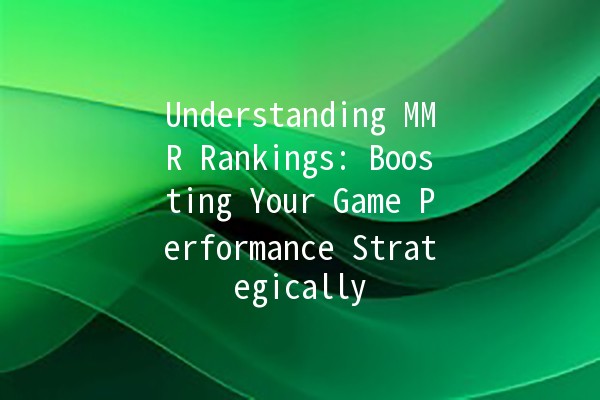In the competitive realm of online gaming, “MMR” or Matchmaking Rating has become a critical measurement of a player's skill level. It influences matchmaking processes, ensures balanced games, and directly affects players' enjoyment and progress. As players strive to climb the ranks, understanding MMR rankings is essential for maximizing game performance. This article will delve into effective techniques for improving your MMR, providing practical examples for each method to help enhance your gaming experience and strategy.
What Are MMR Rankings?
MMR, or Matchmaking Rating, serves as a quantifiable number representing a player's skill level in competitive gaming environments. This numerical rating typically ranges from a minimum threshold to a maximum ceiling, fluctuating based on individual performance in ranked matches. MMR affects the player pool, ensuring that gamers are matched with others of similar skill levels, which is crucial for healthy competition.

Why MMR Matters
Having a solid understanding of MMR is imperative for several reasons:
By focusing on MMR management, players can more effectively enhance their gameplay experience.
Five Key Techniques for Improving MMR Rankings
To enhance your MMR effectively, consider incorporating the following five techniques into your gameplay routine.
Explanation: Specializing in one or two characters allows you to learn intricate mechanics and strategies, improving your overall performance.
Practical Application :
Choose a Main Character
Study Character Mechanics : Familiarize yourself with the abilities, strengths, weaknesses, and combos of your main character. Utilize guides or tutorials to gain an edge.
Practice in Different Scenarios: Engage in varied situations, such as duels, team fights, or objectives, to understand your character’s limits and optimize your gameplay tactics.
Explanation: Game awareness refers to your ability to recognize ingame events, anticipate opponent actions, and make strategic decisions accordingly.
Practical Application
Map Awareness
Track Enemy Cooldowns
Watch Pro Plays
Explanation : Clear communication is essential in teambased gaming, fostering coordination and enhancing strategy execution.
Practical Application :
Utilize Pings and Voice Chat
Create a Game Plan: Establish a consensus on game strategies before matches begin, fostering collaboration and shared objectives.
Stay Positive : Promote positivity regardless of match outcomes. Encouragement can boost team morale and performance during challenging games.
Explanation: Concentrating on personal skill development can directly impact overall performance and MMR.
Practical Application
Analyze Your Replays : Record and revisit your games to identify mistakes or suboptimal plays. Develop an action plan to rectify identified weaknesses.
Set Specific Goals : Define shortterm goals (e.g., improving mechanics) and longterm goals (e.g., reaching a specific MMR tier) to keep track of progress systematically.
Practice Regularly : Allocate time for focused practice sessions, including aim training or character mastery, enhancing core skills needed for competitive play.
Explanation: The game meta, or the most effective strategies and character selections at any given time, evolves as patches and updates occur.
Practical Application :
Stay Updated on Patch Notes: Regularly read patch notes to understand buffs, nerfs, or changes to character abilities that might affect gameplay dynamics.
Adapt Your Playstyle: Modify playstyles according to shifts in character viability; if a character becomes stronger in the current meta, consider incorporating them into your repertoire.
Explore Alternative Strategies: Be open to experimenting with different approaches or character builds to gain a competitive edge against opponents.
Frequently Asked Questions about MMR Rankings
What is a good MMR rating?
A good MMR rating varies greatly between games and communities. Generally, achieving an MMR above the average player level (often around the 50th percentile) signifies proficiency. Higher MMR ratings indicate advanced skill; for example, in many competitive shooters or MOBAs, a rating above 3000 may be considered excellent. Understanding what constitutes “good” can help set personal benchmarks.
How can I check my MMR?
Most competitive games provide players with an internal ranking system, visible within the game’s interface. Players can often view their current MMR alongside ranked divisions or tiers. Additionally, thirdparty websites may aggregate player statistics, offering detailed insights into performance history and current MMR standings.
Can my MMR drop?
Yes, MMR can drop if a player consistently loses matches. MMR systems penalize lowperformance games to reflect decreasing skill levels accurately. Ensuring improvement and maintaining consistent play is crucial to prevent demotion.
Are there penalties for leaving games?
Leaving games is typically discouraged and can result in penalties, including temporary matchmaking bans or MMR deductions. To foster a fair environment, maintaining commitment throughout matches is essential.
Is MMR the only way to track skill?
While MMR is a primary metric for assessing skill in competitive gaming, other indicators such as rank tiers, win rates, and performance stats can also provide insights into a player's abilities. Combining these metrics can yield a holistic view of a player's skill set.
How long does it take to rank up?
The time required to rank up can vary, primarily based on individual performance, games played, and the current MMR standing. Players who consistently win and maximize their skills can see significant improvements within a few weeks. Set realistic expectations while prioritizing steady growth over rapid advancement.
By implementing the above strategies, players can enhance their MMR systematically, leading to more rewarding and enjoyable gaming experiences in competitive environments. Learn, adapt, and apply these techniques to elevate yourself in the ranks and optimize your gaming journey.